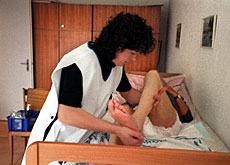Women politicians join forces

Switzerland’s women politicians are campaigning for greater female representation in politics, after just one woman was re-elected to the cabinet last year.
Female parliamentarians are planning to hold a national congress next year to raise awareness of women’s issues.
Female politicians received a wake-up call on December 10 when the justice minister, Ruth Metzler, was dumped in favour of the populist hardliner, Christoph Blocher.
Christine Beerli, a candidate from the centre-right Radical Party, was also turned down in favour of her party colleague, Hans Rudolf Merz.
Micheline Calmy-Rey, the Social Democrat foreign minister, was the only woman to survive the shake-up in the seven-strong cabinet.
“I was shocked the way things panned out,” said Barbara Perriard, a spokeswoman for the female branch of the Radical Party. “It had nothing with Metzler’s or Beerli’s skills, but rather with the fact that they were women.”
“That was the day I was converted to feminism,” she told swissinfo.
The elections prompted a 15,000-strong demonstration just a few days later in the Swiss capital, Bern, calling for more women in the cabinet.
National congress
The date for the women’s congress has tentatively been set for December 10, 2005 – exactly two years after the changes to cabinet make-up.
The Left has been battling for years on the issue of equal rights, but women on the Right have been slower on the uptake.
On Friday, female members of the rightwing Swiss People’s Party withdrew their support for the congress.
Others said they were not convinced that a congress would help promote equality.
Regula Stämpfli, a political scientist, said progress would be only made if the gathering tackled issues such pornography and the sexual exploitation of women and children.
Stämpfli also reckons that women can achieve more for equality through business, the media and the civil service, rather than through politics.
Quotas
One of the thorniest issues up for discussion is the possible introduction of gender quotas in politics.
In March 2000, the Swiss voted on equal political representation for men and women, a leftwing initiative that was turned down by more than 80 per cent of the electorate.
Female politicians on the Left still defend the quota system despite this defeat at the polls.
“Research has shown that when women have at least 30 per cent representation anywhere, it provokes change in culture and values,” Kathrin Scheidegger-Ogi, deputy secretary general of the Social Democrats, told swissinfo.
But others are uneasy about the implementation of quotas. Thérèse Meyer, a Christian Democrat, fears that such a system would strip female politicians of their legitimacy.
“We would end up with a two-tier system and that would be a real problem,” she added. “There have to be other ways of guaranteeing better representation.”
Maternity
Female politicians face a number of battles ahead of the congress. The People’s Party has forced the issue of maternity leave to a nationwide vote, to be held in the autumn.
They are looking to overturn a new law which would give employed mothers 14 weeks of statutory paid leave on 80 per cent of their salary.
The People’s Party says Switzerland cannot afford to introduce statutory maternity leave.
Switzerland is the only country in western Europe that does not have statutory maternity leave.
swissinfo
There is only one woman in Switzerland’s seven-member government, the Social Democrat Micheline Calmy-Rey.
Women make up roughly one quarter of the Swiss Parliament.
Swiss women have been able to vote at the national level since 1971.
Switzerland’s female politicians have announced a national women’s congress to discuss representation in politics.
They are reacting to the ouster of the Swiss government’s two female ministers last December.
Swiss women have held five congresses since the end of the 19th century.
The last one, four years after women gained voting rights in 1971, focused on equal rights for women and men, which was added to the Constitution in 1981.

In compliance with the JTI standards
More: SWI swissinfo.ch certified by the Journalism Trust Initiative











You can find an overview of ongoing debates with our journalists here . Please join us!
If you want to start a conversation about a topic raised in this article or want to report factual errors, email us at english@swissinfo.ch.